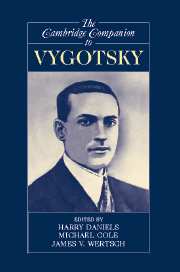Book contents
- Frontmatter
- Editors’ Introduction
- Part I: Vygotsky in Context
- Part II: Readings of Vygotsky
- 6 Terminology in L. S. Vygotsky’s Writings
- 7 Mediation
- 8 Vygotsky and Culture
- 9 Thought and Word: The Approaches of L. S. Vygotsky and G. G. Shpet
- 10 The Development of Children’s Conceptual Relation to the World, with Focus on Concept Formation in Preschool Children's Activity
- 11 Inside and Outside the Zone of Proximal Development: An Ecofunctional Reading of Vygotsky
- Part III: Applications of Vygotsky’s Work
- References
- Index
6 - Terminology in L. S. Vygotsky’s Writings
from Part II: - Readings of Vygotsky
Published online by Cambridge University Press: 28 November 2007
- Frontmatter
- Editors’ Introduction
- Part I: Vygotsky in Context
- Part II: Readings of Vygotsky
- 6 Terminology in L. S. Vygotsky’s Writings
- 7 Mediation
- 8 Vygotsky and Culture
- 9 Thought and Word: The Approaches of L. S. Vygotsky and G. G. Shpet
- 10 The Development of Children’s Conceptual Relation to the World, with Focus on Concept Formation in Preschool Children's Activity
- 11 Inside and Outside the Zone of Proximal Development: An Ecofunctional Reading of Vygotsky
- Part III: Applications of Vygotsky’s Work
- References
- Index
Summary
THE NEED FOR LOGICO-SEMANTIC ANALYSIS (LSA)
There are many reasons why it is difficult for readers to analyze and to understand Vygotsky's terminology. He developed his psychology in a direct and indirect dialogue with many other authors. In doing so, he absorbed and processed all the ideas and terms that he believed could be useful. These ideas ranged from the philosophy of Spinoza and Marx to the American behaviorism of Watson and the linguistics of Sapir. However, when one meets a seemingly familiar term borrowed from some predecessor in Vygotsky's writings, one should keep in mind that he was likely to have modified the term's meaning.
Another motivation for a logico-semantic analysis of Vygotsky's writings is the quantity, variety, and nature of his scientific heritage. A 1960 bibliography of Vygotsky's works includes 274 titles (Vygotsky, 1960). Excluding nonscientific articles and notes devoted for the most part to the events of literary and theatrical life (1916-1923), there remain around 190 works in psychology, written from 1924 until Vygotsky's death (June 11, 1934): a period of only ten years. Many items from this decade were written very quickly, in almost telegraphic style. Some works remain unfinished. It is certainly possible that some of the works that were published posthumously were not yet intended for publication (unfortunately, the editors of contemporary editions do not always warn the reader about the state and nature of the original texts). Therefore, when reading Vygotsky's works one needs to remember his own words (from a letter to A. N. Leontiev dated July 31, 1930), “our writings are imperfect but there is great truth in them. This is my symbol of faith. . . . ” (Vygotsky, 1960, p. 169).
- Type
- Chapter
- Information
- The Cambridge Companion to Vygotsky , pp. 155 - 177Publisher: Cambridge University PressPrint publication year: 2007
- 17
- Cited by



